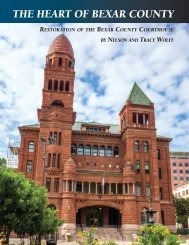Notable New Orleanians: A Tricentennial Tribute
An illustrated history of New Orleans paired with the histories of companies that have helped shape the city.
An illustrated history of New Orleans paired with the histories of companies that have helped shape the city.
Create successful ePaper yourself
Turn your PDF publications into a flip-book with our unique Google optimized e-Paper software.
distinguished reputation in the wars of St. Domingo,” formed the newest battalion “chiefly with refugees<br />
from that island.” 3<br />
Four days after their mustering in, the Second Battalion’s first battle occurred during the savage<br />
night-time battle of December 23 on the banks of the Mississippi River. During the skirmish, Savary and<br />
his men fought back the British who were attempting to enter the city. In French, and reminiscent of<br />
the La Marseillaise, he urged his men to “March on! March on, my friends, march on against the enemies<br />
of the country.” After the commanding victory of the Americans on January 8, 1815, General Jackson<br />
noted that the British rout began when one of Savary’s men killed British Commanding General Edward<br />
Pakenham on the field of battle. Jackson publicly praised the Second Battalion and its commander, stating<br />
that saying, “Savary’s volunteers manifested great bravery….” 4<br />
On January 21 Jackson spoke to the troops assembled at Chalmette “recounting in glowing<br />
words the major events of the campaign, and taunting the enemy with the miserable frustration of<br />
their designs. He also used the occasion to laud the bravery of “Major Joseph Savary, a Free Man<br />
of Color from Haiti who had performed spectacularly during the fight.” 5<br />
When the war ended, however, white <strong>New</strong> <strong>Orleanians</strong> persuaded Jackson to order the black<br />
troops out of the city. But, <strong>New</strong> Orleans and Louisiana did not forget Savary. In 1819, the State of<br />
Louisiana granted him a pension of $30 a month, which ten years later was still in effect. 6 That year<br />
Savary headed a pump brigade for the fire department, while the city council provided their lodging<br />
on Hospital Street. 7 He had descendants for a century later; pioneering black historian Charles<br />
Roussève noted that his granddaughter had married prominent Creole Joseph-Celestin Rousseau. 8<br />
1 Marcus Christian, “Negro Soldiers in the Battle of <strong>New</strong> Orleans,” in Gary D. Joiner, ed., The Battle of <strong>New</strong> Orleans: A<br />
Bicentennial <strong>Tribute</strong> (Gretna: Pelican Publishing Company, 2015), 229-252.<br />
2 Jack D. L. Holmes, Honor and Fidelity: the Louisiana Infantry Regisment and the Louisiana Militia Companies, 1766-1821<br />
(Birmignahm, 1965), 55. See also Roland C. McConnell, Negro troops of antebellum Louisiana; a history of the Battalion of<br />
Free Men of Color (Baton Rouge: Louisiana State University Press, 1968).<br />
3 Christian, 243.<br />
4 Charles Gayarré, History of Louisiana. The American Domination (<strong>New</strong> Orleans: F. F. Hansell & Bro., Ltd., 1903), IV, 433.<br />
5 Winston Groom, Patriotic Fire: Andrew Jackson and Jean Laffite at the Battle of<br />
<strong>New</strong> Orleans (<strong>New</strong> York: Vintage books, 2007), 228.<br />
6 Robert Ewell Greene, Black Defenders of America, 1775-1973 (Chicago: Johnson Publishing Company Inc.,. 1974);<br />
Roland C. McConnell, Negro Troops of Antebellum Louisiana: A History of the Battalion of Free Men of Color (Baton Rouge:<br />
Louisiana State University Press, 1968). Annie Lee West Stahl, “The Free Negro in Ante-Bellum Louisiana” in Louisiana<br />
Historical Quarterly, XXV (April 1942): 327-9.<br />
7 <strong>New</strong> Orleans Argus Feb 23, 1828. P. 3<br />
8 Charles B. Roussève, The Negro in Louisiana: aspects of his history and his literature ( <strong>New</strong> Orleans: Xavier University Press,<br />
1937), 28-29, 65.<br />
<br />
J EAN L AFFITE (1782-1823) AND<br />
P IERRE L AFFITE (1770 TO 1822)<br />
The subject of endless biographies; disagreements over whether he was a privateer or a pirate; controversy<br />
over an authentic-sounding personal journal written on period paper with authentic-looking signatures<br />
allegedly written decades after he was supposed to be dead; recognized and given a Presidential<br />
pardon for his contributions to the Battle of <strong>New</strong> Orleans that at least one historian has now concluded<br />
were of little significance; and a commodified tourist draw for <strong>New</strong> Orleans’ Jean Laffite will not go away.<br />
Perhaps he is one of those figures who remain famous because everyone has heard of him. More<br />
likely, easily impressed adventurers seeking the exotic in preference to the workaday prefer to hear<br />
BIOGRAPHIES<br />
31
















